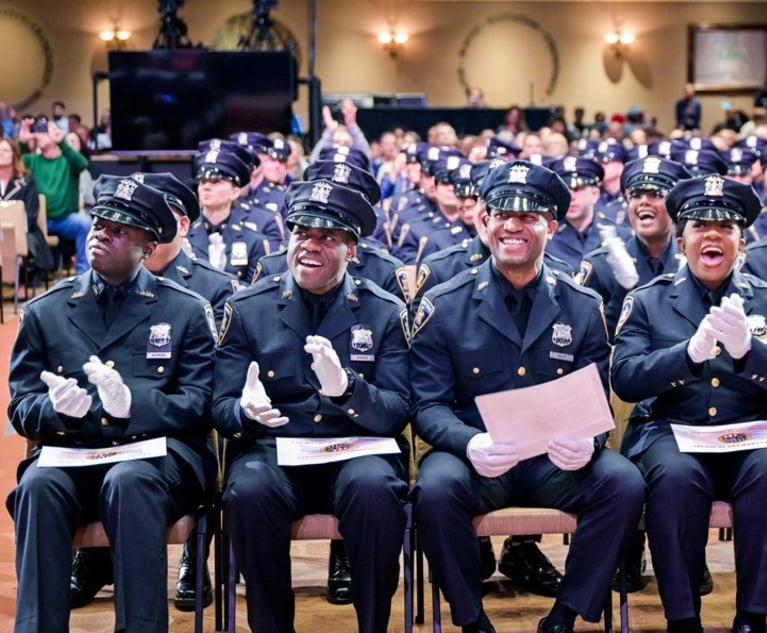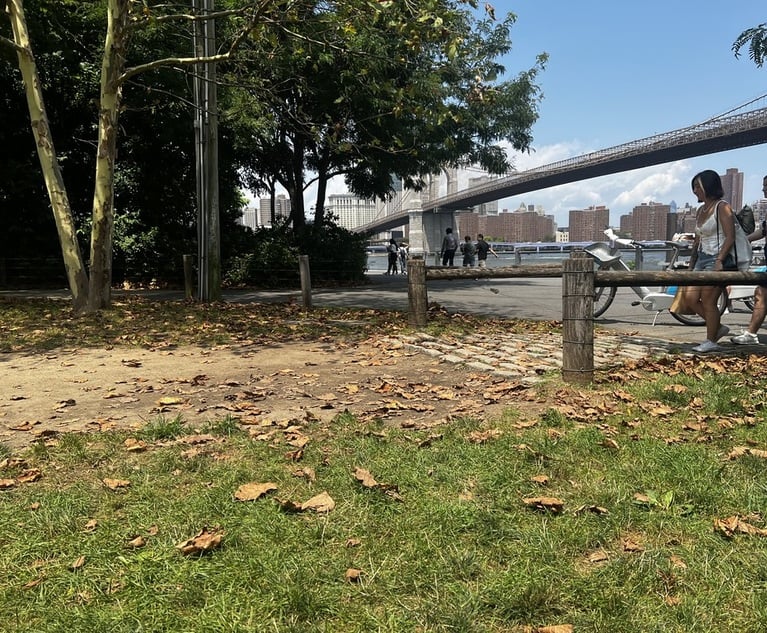 Jeffrey Epstein. Photo: New York State Sex Offender Registry
Jeffrey Epstein. Photo: New York State Sex Offender RegistryJeffrey Epstein Accusers Handed Major Loss in Suit Over Government Plea Deal
"This litigation has brought national attention to the Crime Victims' Rights Act, and the importance of victims in the criminal justice system," U.S. District Judge Kenneth Marra wrote.
September 16, 2019 at 07:51 PM
5 minute read
The original version of this story was published on Daily Business Review
Two women accusing former financier Jeffrey Epstein of sexual abuse lost on several requests they'd made in their suit against the U.S. government over its infamous plea deal with the convicted sex offender.
The decision came from the same federal judge who had ruled that prosecutors broke federal law in handling Epstein's case more than a decade ago, when former U.S. Labor Secretary Alexander Acosta had negotiated the agreement as U.S. attorney for the Southern District of Florida.
But Monday, U.S. District Judge Kenneth Marra of the Southern District of Florida refused to sanction the government, which he found acted in good faith during the litigation.
Epstein died by suicide Aug. 10 in a secure housing unit of the federal Metropolitan Correctional Center in New York, while awaiting trial on charges charges he ran a child-sex ring out of his luxury homes in Manhattan and Palm Beach.
The plaintiffs, identified as Jane Doe 1 and Jane Doe 2, asked the court for money damages, attorney fees, a meeting with Acosta, production of FBI documents, educational remedies, a motion to strike a filing filed on Epstein's behalf after his death, and an injunction against the U.S. Attorney's Office, among other requests.
But Marra denied those requests in the suit that alleges the government violated the Crime Victims' Rights Act by giving Epstein a deal that shielded him and his accomplices from federal prosecution.
The judge's order acknowledged his own February finding that Florida federal prosecutors violated the Crime Victims' Rights Act by not informing the petitioners of the non-prosecution agreement Epstein reached with authorities that precluded him from facing more serious sex crime charges.
But Marra ruled the women could not receive damages because the Crime Victims' Rights Act did not allow it. He also rejected their motion for attorney fees.
"To the extent petitioners seek fees by claiming the government acted in bad faith or vexatiously, the court rejects that position," the judge wrote. "Although unsuccessful on the merits of the issue of whether there was a violation of the CVRA, the government asserted legitimate and legally supportable positions throughout this litigation. Thus, there is no basis to grant petitioners attorney's fees as a sanction."
|
Read the order:
Marra also denied the plaintiffs' requested restitution on the grounds "there is no real and immediate threat of repeated violations of the CVRA, and that any injury that occurred in this case will remain entirely in the past." He also reasoned their request for an award is "essentially a request for money damages from the government, which is not allowed under the CVRA."
"Petitioners would have to point to a specific statute that authorizes an award of restitution," he wrote.
Despite acknowledging that his order brought an end to "this lengthy and contentious litigation" and the plaintiffs "are not receiving much, if any, of the relief they sought," Marra asked the petitioners to take solace in the wider effects their case has had.
"This litigation has brought national attention to the Crime Victims' Rights Act and the importance of victims in the criminal justice system," he wrote, noting the case "also resulted in the United States Department of Justice acknowledging its shortcomings in dealing with crime victims," and prompted officials to publicly commit to better handling victims' rights matters moving forward.
"Rulings which were rendered during the course of this litigation likely played some role, however small it may have been, in the initiation of criminal charges against Mr. Epstein in the Southern District of New York, and that office's continuing investigation of others who may have been complicit with him," Marra added.
Byung J. "BJay" Pak, U.S. attorney for the Northern District of Georgia, called Marra's order "appropriate and a proper application of the law." In a statement to the press, Pak also noted the U.S. Attorney's Office for the Southern District of Florida made internal changes in the wake of controversy over its handling of the case against Epstein.
"The additional training offered to the U.S. Attorney's Office for the Southern District of Florida is one part of the department's overall effort to support and protect victims of crime," Pak said. "Our team also will continue to work with the Southern District of New York to make sure the victims' voices are heard in this matter."
Attorney Brad Edwards—partner with the Fort Lauderdale-based law firm Edwards Pottinger—and former Utah federal judge Paul Cassell, a victims' rights advocate, represented the plaintiffs in the case. A joint statement by Edwards and Cassell said they are "exploring all options for continuing the fight, including the possibility of an appeal."
"As Judge Marra alluded to in his order, this case undoubtedly elevated public awareness of Mr. Epstein's crimes and played a vital role in his eventual arrest in New York," the statement said. "Of course, this is not the ending we had hoped for, but the enormous progression of victims' rights through this case will ensure that violations like this never happen again in this country. For that, the fight was worth it."
Related stories:
This content has been archived. It is available through our partners, LexisNexis® and Bloomberg Law.
To view this content, please continue to their sites.
Not a Lexis Subscriber?
Subscribe Now
Not a Bloomberg Law Subscriber?
Subscribe Now
NOT FOR REPRINT
© 2025 ALM Global, LLC, All Rights Reserved. Request academic re-use from www.copyright.com. All other uses, submit a request to [email protected]. For more information visit Asset & Logo Licensing.
You Might Like
View All
Latest Class of Court Officers Sworn Into Service in New York

Decision of the Day: Judge Reduces $287M Jury Verdict Against Harley-Davidson in Wrongful Death Suit

Decision of the Day: Judge Denies Summary Judgment Motions in Suit by Runner Injured in Brooklyn Bridge Park

Decision of the Day: Administrative Court Finds Prevailing Wage Law Applies to Workers Who Cleaned NYC Subways During Pandemic
Trending Stories
- 1You Too Can Be a Programmer: Connecting to Legal Platform APIs With Generative AI (Part 2)
- 2Court of Appeals and Appellate Division As Courts of First Instance
- 3Federal Judge Slaps Down the SEC’s Attempt to Regulate Crypto Liquidity Providers
- 4A Client Is Guilty; But Another Man Is Wrongfully Convicted
- 5Legal Tech's Predictions for Cybersecurity in 2025
Who Got The Work
Michael G. Bongiorno, Andrew Scott Dulberg and Elizabeth E. Driscoll from Wilmer Cutler Pickering Hale and Dorr have stepped in to represent Symbotic Inc., an A.I.-enabled technology platform that focuses on increasing supply chain efficiency, and other defendants in a pending shareholder derivative lawsuit. The case, filed Oct. 2 in Massachusetts District Court by the Brown Law Firm on behalf of Stephen Austen, accuses certain officers and directors of misleading investors in regard to Symbotic's potential for margin growth by failing to disclose that the company was not equipped to timely deploy its systems or manage expenses through project delays. The case, assigned to U.S. District Judge Nathaniel M. Gorton, is 1:24-cv-12522, Austen v. Cohen et al.
Who Got The Work
Edmund Polubinski and Marie Killmond of Davis Polk & Wardwell have entered appearances for data platform software development company MongoDB and other defendants in a pending shareholder derivative lawsuit. The action, filed Oct. 7 in New York Southern District Court by the Brown Law Firm, accuses the company's directors and/or officers of falsely expressing confidence in the company’s restructuring of its sales incentive plan and downplaying the severity of decreases in its upfront commitments. The case is 1:24-cv-07594, Roy v. Ittycheria et al.
Who Got The Work
Amy O. Bruchs and Kurt F. Ellison of Michael Best & Friedrich have entered appearances for Epic Systems Corp. in a pending employment discrimination lawsuit. The suit was filed Sept. 7 in Wisconsin Western District Court by Levine Eisberner LLC and Siri & Glimstad on behalf of a project manager who claims that he was wrongfully terminated after applying for a religious exemption to the defendant's COVID-19 vaccine mandate. The case, assigned to U.S. Magistrate Judge Anita Marie Boor, is 3:24-cv-00630, Secker, Nathan v. Epic Systems Corporation.
Who Got The Work
David X. Sullivan, Thomas J. Finn and Gregory A. Hall from McCarter & English have entered appearances for Sunrun Installation Services in a pending civil rights lawsuit. The complaint was filed Sept. 4 in Connecticut District Court by attorney Robert M. Berke on behalf of former employee George Edward Steins, who was arrested and charged with employing an unregistered home improvement salesperson. The complaint alleges that had Sunrun informed the Connecticut Department of Consumer Protection that the plaintiff's employment had ended in 2017 and that he no longer held Sunrun's home improvement contractor license, he would not have been hit with charges, which were dismissed in May 2024. The case, assigned to U.S. District Judge Jeffrey A. Meyer, is 3:24-cv-01423, Steins v. Sunrun, Inc. et al.
Who Got The Work
Greenberg Traurig shareholder Joshua L. Raskin has entered an appearance for boohoo.com UK Ltd. in a pending patent infringement lawsuit. The suit, filed Sept. 3 in Texas Eastern District Court by Rozier Hardt McDonough on behalf of Alto Dynamics, asserts five patents related to an online shopping platform. The case, assigned to U.S. District Judge Rodney Gilstrap, is 2:24-cv-00719, Alto Dynamics, LLC v. boohoo.com UK Limited.
Featured Firms
Law Offices of Gary Martin Hays & Associates, P.C.
(470) 294-1674
Law Offices of Mark E. Salomone
(857) 444-6468
Smith & Hassler
(713) 739-1250






